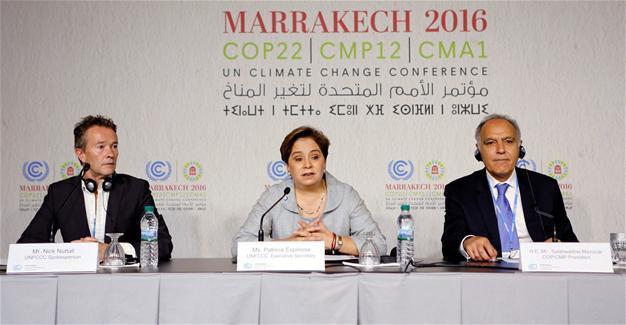UN talks get down to business over climate deal
MARRAKESH, Morocco

The world’s nations gathered in Morocco Nov. 7 to flesh out a landmark climate deal that promises to save humanity from itself. A shadow was cast over the meeting due to the unpredictable result of the U.S. presidential election on Nov. 8.
The just-activated Paris Agreement, inked in the French capital last December, is the first treaty binding all countries, rich and poor, to halt global warming, caused mainly by the burning of coal, oil and gas.
“It is now the roadmap in the fight against climate change,” said Manuel Pulgar-Vidal, Peru’s former environment minister and head of climate and energy for green group WWF, AFP reported.
But as 15,000 negotiators, CEOs and activists from 196 nations gathered in Marrakesh settle in for the 12-day U.N. talks, all eyes are on the United States, where voting Nov. 8 could thrust climate denier Republican presidential candidate Donald Trump into the White House.
When it comes to global warming, the stakes could hardly be higher, U.S. President Barack Obama warned.
“All the progress we’ve made on climate change” - including the Paris pact, decades in the making - “is going to be on the ballot,” he told TV talk show host Bill Maher on Nov. 4.
The Republican candidate cannot carry out his threat to “cancel” the still-fragile accord, but a Trump victory could cripple it, AFP cited experts in Marrakesh as agreeing.
Democratic opponent Hillary Clinton has vowed to uphold Obama’s domestic energy policies and international climate commitments.
Procedural issuesIn Marrakesh, front-line diplomats must roll up their sleeves and work through scores of procedural issues that will make the difference between success and failure.
The most immediate task is “finishing the rulebook” for the complex accord, said Laurence Tubiana, France’s top climate negotiator for the Paris talks.
Concretely, that means working through scores of still-contentious issues, including how to measure and track each nation’s CO2 emissions; disbursing hundreds of billions of dollars in financing in a way that reassures both rich and recipient nations; setting criteria for compensating poor countries devastated by climate-fuelled storms, droughts or floods.
“COP22 is really a COP of implementation and action,” lead U.S. negotiator Jonathan Pershing told journalists in a teleconference, using the acronym for the annual Conference of the Parties climate meet.
By informal consensus, 2018 is the target for working through these issues.
2018 is also the next high-stakes rendezvous in the ongoing talks when nations can further narrow the so-called “emissions gap” between their carbon-cutting pledges and the level of reductions needed to keep the planet from dangerously overheating.
That gap is still huge, and getting bigger every year.
On current trends, the Earth will heat up about three degrees Celsius (5.4 degrees Fahrenheit) above the pre-industrial era benchmark, a sure recipe for climate catastrophe, according to scientists.
The Paris Agreement calls for capping global warming at under 2.0C (3.6F), and even 1.5C (2.7F) if possible - a hugely daunting challenge.
 The world’s nations gathered in Morocco Nov. 7 to flesh out a landmark climate deal that promises to save humanity from itself. A shadow was cast over the meeting due to the unpredictable result of the U.S. presidential election on Nov. 8.
The world’s nations gathered in Morocco Nov. 7 to flesh out a landmark climate deal that promises to save humanity from itself. A shadow was cast over the meeting due to the unpredictable result of the U.S. presidential election on Nov. 8.